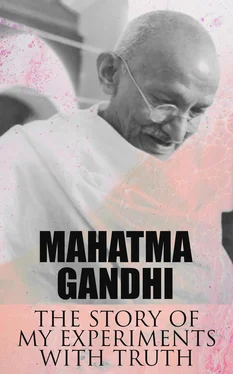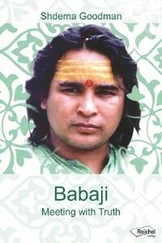Kaba Gandhi married four times in succession, having lost his wife each time by death. He had two daughters by his first and second marriages. His last wife, Putlibai, bore him a daughter and three sons, I being the youngest.
My father was a lover of his clan, truthful, brave and generous, but short-tempered. To a certain extent he might have been even given to carnal pleasures. For he married for the fourth time when he was over forty. But he was incorruptible and had earned a name for strict impartiality in his family as well as outside. His loyalty to the state was well known. An Assistant Political Agent spoke insultingly of the Rajkot Thakore Saheb, his chief, and he stood up to the insult. The Agent was angry and asked Kaba Gandhi to apologize. This he refused to do and was therefore kept under detention for a few hours. But when the Agent saw that Kaba Gandhi was adamant, he ordered him to be released.
My father never had any ambition to accumulate riches and left us very little property.
He had no education, save that of experience. At best, he might be said to have read up to the fifth Gujarati standard. Of history and geography he was innocent. But his rich experience of practical affairs stood him in good stead in the solution of the most intricate questions and in managing hundreds of men. Of religious training he had very little, but he had that kind of religious culture which frequent visits to temples and listening to religious discourses make available to many Hindus. In his last days he began reading the Gita at the instance of a learned Brahman friend of the family, and he used to repeat aloud some verses every day at the time of worship.
The outstanding impression my mother has left on my memory is that of saintliness. She was deeply religious. She would not think of taking her meals without her daily prayers. Going to Haveli—the Vaishnava temple—was one of her daily duties. As far as my memory can go back, I do not remember her having ever missed the Chaturmas. 2She would take the hardest vows and keep them without flinching. Illness was no excuse for relaxing them. I can recall her once falling ill when she was observing the Chandrayana 3vow, but the illness was not allowed to interrupt the observance. To keep two or three consecutive fasts was nothing to her. Living on one meal a day during Chaturmas was a habit with her. Not content with that she fasted every alternate day during one Chaturmas. During another Chaturmas she vowed not to have food without seeing the sun. We children on those days would stand, staring at the sky, waiting to announce the appearance of the sun to our mother. Everyone knows that at the height of the rainy season the sun often does not condescend to show his face. And I remember days when, at his sudden appearance, we would rush and announce it to her. She would run out to see with her own eyes, but by that time the fugitive sun would be gone, thus depriving her of her meal. “That does not matter,” she would say cheerfully, “God did not want me to eat today.” And then she would return to her round of duties.
My mother had strong commonsense. She was well informed about all matters of state, and ladies of the court thought highly of her intelligence. Often I would accompany her, exercising the privilege of childhood, and I still remember many lively discussions she had with the widowed mother of the Thakore Saheb.
Of these parents I was born at Porbandar, otherwise known as Sudamapuri, on the 2nd October 1869. I passed my childhood in Porbandar. I recollect having been put to school. It was with some difficulty that I got through the multiplication tables. The fact that I recollect nothing more of those days than having learnt, in company with other boys, to call our teacher all kinds of names, would strongly suggest that my intellect must have been sluggish, and my memory raw.
Table of Contents
I must have been about seven when my father left Porbandar for Rajkot to become a member of Rajasthanik Court. There I was put into primary school, and I can well recollect those days, including the names and other particulars of the teachers who taught me. As at Porbandar, so here, there is hardly anything to note about my studies. I could only have been a mediocre student. From this school I went to the suburban school and thence to the high school, having already reached my twelfth year. I do not remember having ever told a lie, during this short period, either to my teachers or to my school-mates. I used to be very shy and avoided all company. My books and my lessons were my sole companions. To be at school at the stroke of the hour and to run back home as soon as the school closed,—that was my daily habit. I literally ran back, because I could not bear to talk to anybody. I was even afraid lest anyone should poke fun at me.
There is an incident which occurred at the examination during my first year at the high school and which is worth recording. Mr. Giles, the Educational Inspector, had come on a visit of inspection. He had set us five words to write as a spelling exercise. One of the words was ‘kettle’. I had mis-spelt it. The teacher tried to prompt me with the point of his boot, but I would not be prompted. It was beyond me to see that he wanted me to copy the spelling from my neighbour’s slate, for I had thought that the teacher was there to supervise us against copying. The result was that all the boys, except myself, were found to have spelt every word correctly. Only I had been stupid. The teacher tried later to bring this stupidity home to me, but without effect. I never could learn the art of ‘copying’.
Yet the incident did not in the least diminish my respect for my teacher. I was by nature blind to the faults of elders. Later I came to know of many other failings of this teacher, but my regard for him remained the same. For I had learnt to carry out the orders of elders, not to scan their actions.
Two other incidents belonging to the same period have always clung to my memory. As a rule I had a distaste for any reading beyond my school books. The daily lessons had to be done, because I disliked being taken to task by my teacher as much as I disliked deceiving him. Therefore I would do the lessons, but often without my mind in them. Thus when even the lessons could not be done properly, there was of course no question of any extra reading. But somehow my eyes fell on a book purchased by my father. It was Shravana Pitribhakti Nataka (a play about Shravana’s devotion to his parents). I read it with intense interest. There came to our place about the same time itinerant showmen. One of the pictures I was shown was of Shravana carrying, by means of slings fitted for his shoulders, his blind parents on a pilgrimage. The book and the picture left an indelible impression on my mind. ‘Here is an example for you to copy’, I said to myself. The agonized lament of the parents over Shravana’s death is still fresh in my memory. The melting tune moved me deeply, and I played it on a concertina which my father had purchased for me.
There was a similar incident connected with another play. Just about this time, I had secured my father’s permission to see a play performed by a certain dramatic company. This play—Harishchandra—captured my heart. I could never be tired of seeing it. But how often should I be permitted to go? It haunted me and I must have acted Harishchandra to myself times without number. ‘Why should not all be truthful like Harishchandra?’ was the question I asked myself day and night. To follow truth and to go through all the ordeals Harishchandra went through was the one ideal it inspired in me. I literally believed in the story of Harishchandra. The thought of it all often made me weep. My commonsense tells me today that Harishchandra could not have been a historical character. Still both Harishchandra and Shravana are living realities for me, and I am sure I should be moved as before if I were to read those plays again today.
Читать дальше












